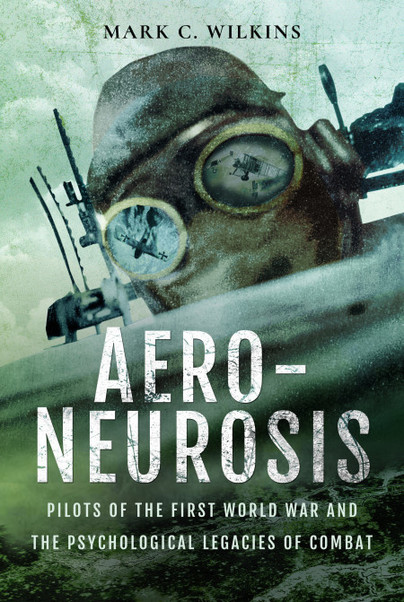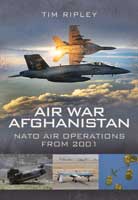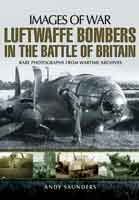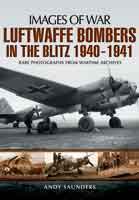Aero-Neurosis (ePub)
Pilots of the First World War and the Psychological Legacies of Combat
Imprint: Pen & Sword Aviation
File Size: 17.0 MB (.epub)
Pages: 162
Illustrations: 16
ISBN: 9781526723130
Published: 30th July 2019
Video via C-Span
'Psychological Impact on World War Pilots': Mark Wilkins examined the psychological impact of World War I aerial combat and the disorder known as 'aeroneurosis', a nervous condition brought on by flying. He also talked about diary entries from pilots who experienced this condition and explores their lives after the war. This event was hosted by Smithsonian Associates.
| Other formats available - Buy the Hardback and get the eBook for free! | Price |
|---|---|
| Aero-Neurosis Hardback Add to Basket | £13.99 |
The young men who flew and fought during the First World War had no idea what was awaiting them. The rise of science and nationalism during the late 19th and early 20th centuries came to a head in 1914. The ‘technology shock’ that coalesced at the Western Front was not envisaged by anyone in a position of leadership. These men did the best they could and gave their full measure but each suffered from their experiences, some better than others. Each knew it was a defining moment in their lives never to be repeated. And many felt that the dynamic context of aerial combat was something that, after the war, they still longed for, despite the attendant horrors.
The medical and psychiatric profession evolved symbiotically with the war. Like the patients they were charged with treating, doctors were unprepared for what awaited them. Doctors argued over best practice for treatment. Of course, the military wanted these men to return to duty as quickly as possible; with mounting casualties, each country needed every man. Aviation psychiatry arose as a new subset of the field, attempting to treat psychological symptoms previously unseen in combatants. The unique conditions of combat flying produced a whole new type of neurosis.
Terms such as Aero-neurosis were coined to provide the necessary label yet, like shell shock, they were inadequate when it came to describing the full and complete shock to the psyche.
We are fortunate that many of these fliers chose to write. They kept diaries and letters about their experiences after the war and they are, of course, an invaluable record. But perhaps more importantly, they were also a means for many of them to heal.
Mark C. Wilkins finds the psychology undergirding historical events fascinating and of chief interest to him as an historian. He has included expert medical testimony and excerpts where relevant in a fascinating book that explores the legacies of aerial combat, illustrating the ways in which pilots had to amalgamate their suffering and experiences into their post-war lives. Their attempts to do so can perhaps be seen as an extension of their heroism.
Featured in
“RIVISTA AERONAUTICA”, the official journal of Italian Air Force - Issue 6, Nov/Dec 21
If you have an interest in WW1 Aviation it is a great introductory book as it covers everything from the early beginnings of aviation to how this new technology was embraced during WW1 & the psychological effect that this new combat had on the men who served.
Treehouse Genealogy
Read the full review here
This is a book that makes you think about what it was like before we recognised the affects of what we now call post-traumatic stress disorder. Imagine, going to war, with new mechanical devices that were untested. You would be the one testing them while trying not to be killed by the machine or by the enemy, who was doing the same thing.
Vintage Airfix
I’ve always loved early planes and the development of early flight. But after reading this book, the human element has become painfully clear. The narratives in this book are well written and compiled together into a fascinating and troubling look into the would of those early English, French, and German aviators.
Read the full review here
... the book is a fascinating collection of narratives about the ‘Aces’ of the Great War and how that war took its toll in various ways on them, before most of them sadly perished.
AERSOPACE magazine, from the Royal Aeronautical Society
Click here for the full review
While the author remains focused on his primary topic, he includes a wealth of supporting anecdotes to keep readers engaged. For those interested in gaining a better understanding of flying as it really existed in 1914-1918, this book is recommended.
Over the Front, Winter 2019
Beginning with a brief survey of mechanised warfare in general before moving on specifically to hazards encountered by aviators, the author then examines the lives of six airmen, two Americans, Elliott White Springs and William Lambert, the Canadian, Roy Brown, Anglo-Irishman, Edward Mannock, Ernest Udet from Germany and the Frenchman, Georges Guynemer. In each chapter he quotes extensively from their own writings and those of their contemporaries. The most cogent summary of his thesis is made on pages 123-24 by RAF psychiatrist, Squadron Leader EW Craig, who lists 18 causes of combat stress in a paper written in 1922.
Flying in Ireland
This is an interesting introduction to a deep and complicated subject.
Read the full review here
This book is highly recommended for anyone seeking to go beyond the superficial labels of “dog fighter” and “Ace”. This book lays bare the grim reality of life on a frontline squadron during the First World War and provides a powerful insight into the comprehensive physical; emotional, and mental decline these Aviators endured whilst in active service.
Donna's Book Blog
It is a testament to the Author that the essential humanity of the featured aviators is allowed to permeate through one of the darkest periods in human history. It is a testament to the candour of the Aviators themselves that battlefield medicine was able to advance the longs that were necessary.
Read the full review here
Any conclusion to a book like ‘Aero-Neurosis’ is in some ways unnecessary. But Wilkins’s is measured and empathetic. His demonstration of the unique duality of emotions fliers suffered - the ‘intoxication and horror’ that inflicted them as they gloried in powered flight whilst experiencing the violent unpredictability of combat in the air - is helpful to give these sad histories perspective. It’s a book that gives some measure of understanding about a kind of warfare that for the airmen, as Wilkins points out was ‘not worse or better, just different.’
Jill Bush Writes
Read the full review here
An original and absorbing study of the psychological factors of the first air war. This new book considers how the young men pioneeering war in the air were affected by their environment and battle experiences – Most Highly Recommended.
Firetrench
Read the full review here
As featured by
RAF Association
Mark Wilkins looks at the psychological problems encountered by pilots involved in First World War battles.
Books Monthly
I found this book extremely moving, the diaries of those men who wrote down their thoughts are very vivid. I particularly found the passage in which a son was writing to his mother and apologising for unloading to her, as if it was something to be ashamed of, to be poignant. It is also interesting to read about Hiram Maxim who is well known for the invention of the machine Gun, but is less well known for the patented pocket menthol inhaler.
Armorama
Read the full review here
About Mark C Wilkins
Mark C. Wilkins is an historian, writer, lecturer, and museum professional. He has been director & curator of both the Cape Cod Maritime Museum and The Atwood House Museum (Chatham Historical Society), and has worked for the Smithsonian Institution & Mystic Seaport. Mark is a published author of books and articles relating to maritime and aviation history. Mark is a contributor to Smithsonian’s Air & Space Magazine and Aviation History magazine. Mr. Wilkins has an A.L.M. in history from Harvard University, and is the historical consultant and producer of aerial effects for the Lafayette Escadrille Documentary Film.















